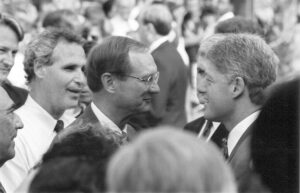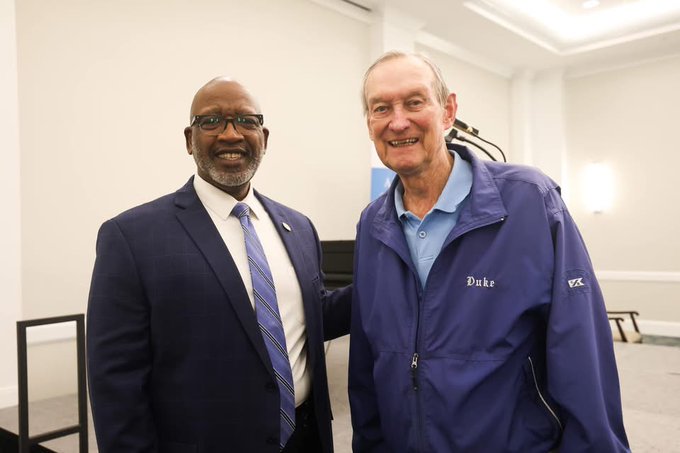By Rick Mayer and Meleah Lyden
Former St. Petersburg Mayor David Fischer, who died Wednesday age 92, was “a dedicated public servant who left lasting impacts on the city,” the city’s current mayor said on social media.
“From the Rays’ first pitch in St. Pete to redefining the role of mayor, he led with vision, humility and a deep love for this community,” Mayor Ken Welch posted. “His work and leadership will forever be a staple in our city’s history, and we are all better for it.”
Welch added that Fischer was a listener who focused on building relationships. He said Fischer believed in “doing the quiet, steady work that moves a community forward.”
His daughter, Susan Fischer McGarry, wrote in a Facebook post that her “wonderful Dad passed away peacefully” after a “nice long life.” She told several media outlets that her father was in hospice, had become weak and had recently suffered a fall.
A three-term mayor (1991-2001), Fischer guided the city through revitalization, civil unrest and the arrival of Major League Baseball.
He was St. Petersburg’s first “strong mayor,” after voters approved a change in 1993 to end the council-manager form of government. Hence, his first two years in office were essentially symbolic.
Once in the accountable role, he lowered property taxes, remained dedicated to building the often-struggling BayWalk (now Sundial) retail complex, established a neighborhood associations department, and promoted the planting of more than 18,000 trees. After his tenure, he remained committed to expanding the canopy, working with the city as the “Tree Czar.”
In a statement, the St. Petersburg Museum of History noted that Fischer collaborated with President Bill Clinton and federal agencies to obtain resources for economic and community initiatives. He was also dedicated to addressing systemic challenges and promoting civic engagement.

Fischer worked with President Bill Clinton and federal agencies to secure resources for economic and community initiatives. Photo: St. Petersburg Museum of History.
“As a civic leader, he recognized and acted upon the need to make urban life more vibrant and inclusive,” the museum wrote. “Fischer’s death marks the conclusion of a chapter in St. Petersburg’s civic history. His legacy remains embedded in the city’s physical and civic landscape.”
That chapter included navigating perhaps the city’s most difficult era in race relations. The tension boiled over on Oct. 24, 1996, with the fatal shooting of 18-year-old TyRon Lewis, a Black motorist, by a white St. Petersburg police officer.
Lewis’ death and the later clearing of the officers ignited two waves unrest in the predominantly Black Midtown neighborhood. Fischer declared a state of emergency, deployed more than 300 officers, and placed the National Guard on alert. The violence included looting, dozens of arson fires, injuries and arrests, and millions of dollars in property damage, according to media reports.
While some criticized Fischer’s initial handling of the violence, he emphasized calm and restraint, met with community and church leaders, and launched initiatives to rebuild trust. In the months following, he helped form police-community partnerships and economic revitalization programs to ease tensions and foster reconciliation.
In 1997, he appointed Goliath Davis III as the city’s first African American police chief, who worked to transform the police department’s culture.
Fischer once remarked that he came into office with a brand-new $140 million domed stadium but no team to play in it.
The Florida Suncoast Dome, opened in 1990, served as a temporary hockey home for the Tampa Bay Lightning for two years, but remained mostly empty through multiple failed efforts to attract Major League Baseball.
“If we didn’t get a team, I was going to go down in history as the guy who didn’t get a team,” Fischer told the then-St. Petersburg Times.
Fischer continued his support, and eventually the Tampa Bay Devil Rays were awarded as an expansion team to play in the renamed Tropicana Field. He was there for the first game on March 31, 1998.
In 2000, Fischer decided he would not seek a fourth term. In 1993, a charter amendment was passed to limit mayors to two consecutive four-year terms, but Fischer was exempt because he was already in office. Nevertheless, he decided to move on from his political career, which began on the City Council from 1975 to 1979.
Fischer was born July 24, 1933, in Evanston, Illinois. He graduated from Duke University in 1955 with a business degree and served three years as a pilot in the U.S. Air Force. After moving to St. Petersburg in the early 1960s, he worked as a financial consultant and municipal bond dealer.
“He planted over 10,000 trees in the city, the Tree Czar!” his daughter wrote on Facebook. “He leaves an incredible legacy of philanthropy and development of the city, supporting many organizations relative to education, minorities, children, church, animals and the arts. Love you Dad!”
Rick Mayer is the online producer for Health News Florida at WUSF, the Tampa Bay area’s NPR affiliate. Meleah Lyden is a digital news producer for WUSF.

